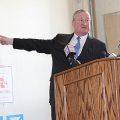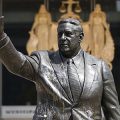
The death of George Floyd appears to have brought police brutality into sharper focus for the people for who it might not have been before. But will it bring the criminal justice reform that activists have asked for?
ABOVE PHOTO: Artists complete a mural of George Floyd outside of Cup Foods, Thursday, May 28, 2020 in Minneapolis/ Minnesotans took to the streets in a third day of protests following the death of George Floyd at the hand of Minneapolis police officers. (Mark Vancleave/Star Tribune via AP)
By Denise Clay
Since it was placed in front of the City of Philadelphia’s Municipal Services Building on the JFK Parkway in 1999, the statue of former Mayor Frank Rizzo has been a symbol of the discussion of police brutality in the city, if not the world.
Rizzo, who was also the city’s police commissioner before becoming mayor, was known for sending the Philadelphia Police Department into Black neighborhoods and allowing it to, well, run amok. The front page photos of Rizzo in a tuxedo — night stick in the cummerbund — watching the strip search of the Black Panthers after a raid of the group’s headquarters went around the world.
Activists, many of whom remembered the Rizzo years, have been calling for the statue to come down. Mayor Jim Kenney promised that he would as part of the remodeling of Thomas Paine plaza. But the mayor changed his mind, and the statue came down early Wednesday morning instead.
Why? Well, the fact that someone set the Rizzo statue in fire as part of a Saturday march protesting the death of George Floyd at the hands of Minneapolis police probably played a part.
While it didn’t melt, the fire sent a message, said Melissa Robbins, an activist and former City Council candidate who has been involved in many of the protests.
“People are tired and people are angry,” she said.
Over the last 10 days, as protestors of all races, creeds and colors have taken to the streets demanding justice for George Floyd, Breonna Taylor, Ahmaud Arbery, Manuel Ellis, and everyone else who has been killed by people who are police or police adjacent, longtime demands, like getting rid of the Rizzo statue, are finally being met.
But does this represent a turning of the corner when it comes to criminal justice reform in general and reforming policing in particular? People who have been following this issue for a long time are optimistic, but some also say that the virtue of patience is in short supply.
As a part of the Live Free campaign for POWER (Philadelphians Organized to Witness, Empower and Rebuild) which focuses on criminal justice reform, the Rev. Dr. Mark Kelly Tyler has worked with a lot of groups internationally that are trying to solve the problem of policing.
He’s heard from many of them since the death of George Floyd, including a colleague in Amsterdam who was able to organize a protest against two high profile murders of Black men there that resulted in 10,000 people taking to the streets.
The George Floyd protests have felt different to Tyler because the crowds would indicate that White people have finally started to realize that the yoke of White supremacy and how that manifests itself through policing isn’t the Black communities problem alone.
“Getting rid of White privilege and White supremacy are going to take a herculean effort to overcome,” he said. “[The protests] have been encouraging. In Ferguson, the protestors were mostly Black with White allies and supporters marching with us. But this time, marches are being organized by White people and have been mostly white. It’s like they’re owning their complicity, something that they often haven’t wanted to admit to.”
“I think that it’s been different because of the immediate reaction,” Keir Bradford-Grey, chief of the Defenders Association of Philadelphia. “The volume of the reaction was so amplified that people had no choice but to listen. It was like the lid bursting on a pressure cooker.”
Among the things that the protests started getting people to talk about was policing itself. At a news conference held on Election Day at the Octavius V. Catto statue, a group of elected officials called for reforms designed to improve police/community relations and increase accountability in the Commonwealth’s police departments.
Extrajudicial killings of citizens by police have to stop, State Rep. Malcolm Kenyatta said. The opportunity to make things better has arrived, and the people who can best make that change — elected officials — will never be greater than it is right now, he said.
“One thing that’s different is that we can’t go back to the “normal” that got us here,” he said. “One thing that we’ve learned from this whole experience is that government matters. We have to meet this moment with policy. … and [through] engaging in the political process, one that is imperfect but necessary.”
City Councilman Kenyatta Johnson, who was also at the news conference, is currently working with his colleagues to pass a revised city budget. Due to the coronavirus, Mayor Kenney’s original 2021 budget had to be revamped to cover a $650 million deficit.
Among the things that has been proposed in the budget is a $14 million increase in the police department’s budget, something that activists have decried. Johnson said that will definitely be looked at, as will everything regarding public safety financing.
He also wants to make the Police Advisory Commission, a group whose charge is to hold the police accountable, more able to do that, Johnson said.
“I want to make sure it has teeth,” he said. “Currently, the police department doesn’t answer it’s subpoenas or give them information. That needs to change and the mayor needs to get involved. He could issue an executive order to do this.”
To Tyler, the mayor shouldn’t be the one making those decisions. There’s only so much independence that the advisory commission can have under its current structure, he said.
“POWER has already called to separate the advisory commission from the mayor’s office,” Tyler said. “It should be an independent watchdog group. Both the director of the advisory commission and the police commissioner are hired by the mayor, but it should be more like the Public Defender, which is hired by an independent board, but gets city funds. Right now, it’s understaffed, it has no budget to help it keep up with complaints, and there are systemic barriers that keep the commission from getting the information it needs. The legislation to make it independent needs to be put together and now is the time.”
But for any reforms to be successful, it has to be a group effort, Bradford-Grey said.
“For real, practical reform, we need to stop talking past each other,” she said.
Much of the media coverage of the protests has focused on the property damage and looting that has been connected to them, despite the fact that the protests themselves have been peaceful.
While it’s important to consider that these incidents — especially the ones in the city’s neighborhood commercial corridors — will have a long-term impact in terms of the city’s poverty rate, this focus can’t be the only one, said Ernest Owens, writer-at-large for Philadelphia Magazine.
Context is key, said Owens, who is also the vice president for print of the Philadelphia Association of Black Journalists.
“We can’t just talk about the property damage,” he said. “We also have to talk about what led to the property damage. What factors caused it. Whenever Blacks are killed by police, the first thing that’s asked is ‘What did he do?’ We need to ask the same thing of these institutions. What could make people so angry? We have to focus on the cause.”
Robbins agreed.
“Talking about the property damage is the wrong conversation,” she said. “We have to ask how we got to this point. [The people] have been ignored over and over again. If that continues, we’ll be right back here again.”
While it’s a good thing that officials are listening, they might want to listen quickly, Owens said. Patience is a virtue, but for the most part, the patience of the communities most impacted by police misconduct is gone, he said.
“When it comes to addressing these issues, making changes incremental has gone out the door,” he said. “We don’t have the time. People are fed up.”
While the people have spoken and it looks like they may have finally be heard at least a little, there’s one group of people who will probable be heard from soon, and their voices will be much angrier. That group? The partisans of Frank Rizzo. In an angry Facebook post, former state senator and Kenney mentor Vincent Fumo blasted his protégé for taking the statue down, using words you can’t necessarily repeat in a family newspaper.
Chances are that Fumo and others will have more invective for the mayor thanks to another defeat they were handed at press time. The S. 9th Street Shopping District announced on Thursday that DiBruno Brothers, the owners of the building where the Frank Rizzo mural currently resides, has given the okay for the Mural Arts program to paint over the mural and replace it with a public art piece designed to promote healing.
On Wednesday, Mural Arts announced that it would no longer clean up the Rizzo mural, which is the most defaced mural in the city’s collection, after DiBruno Brothers, the owners of the building on which the mural was housed, initially refused to grant them permission to decommission it. The wall will be a blank space until that piece of art is created. That’s something it’ll have in common with criminal justice reform in Philadelphia.

















Leave a Comment